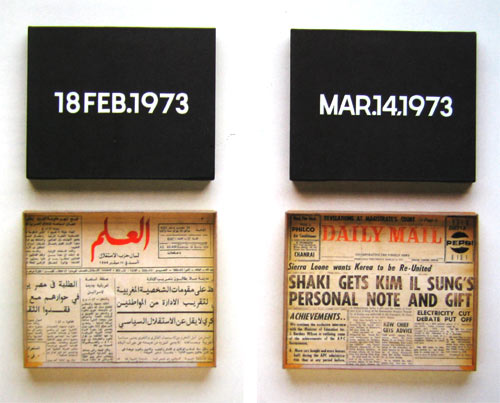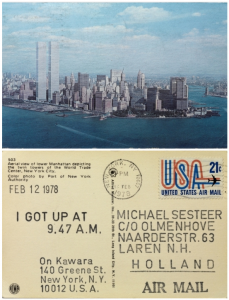Perhaps because I am currently working on a project that utilizes photographs that I have made on a daily, monthly, and yearly basis, I am intrigued by artists who have taken that approach in their own work, regardless of medium. On Kawara (1932-2014), a conceptual artist born in Japan, certainly fits that mode.  For 48 years, he would spend a part of each day making a painting that had at its center the date on which he was painting it (his "Today" series). Other creative methods he used were mapping the places he'd been, and keeping daily lists of people he met. Between 1970 and 2000, he sent his friends more than 900 telegrams just to tell them that he was still alive.
For 48 years, he would spend a part of each day making a painting that had at its center the date on which he was painting it (his "Today" series). Other creative methods he used were mapping the places he'd been, and keeping daily lists of people he met. Between 1970 and 2000, he sent his friends more than 900 telegrams just to tell them that he was still alive. In the pre-social networked age that we live in today, that kind of thing would perhaps have labeled him as eccentric. Today it makes him seem to have been far ahead of his time. It's possible that, if he were a young artist today, he would have been posting a daily Instagram of each meal, sending weekly selfies on Snapchat (without showing his face, as he was obsessively private), and tweeting his whereabouts on Twitter. Taken together, his work creates an archive of his life.
In the pre-social networked age that we live in today, that kind of thing would perhaps have labeled him as eccentric. Today it makes him seem to have been far ahead of his time. It's possible that, if he were a young artist today, he would have been posting a daily Instagram of each meal, sending weekly selfies on Snapchat (without showing his face, as he was obsessively private), and tweeting his whereabouts on Twitter. Taken together, his work creates an archive of his life.
In an article on Artnet.com, critic Ben Davis wrote that Kawara not only anticipated our data-obsessed age, "he offers an alternative way of thinking about it, a possible model for how to stay human amid it all."
That brings up the issue of the culture of sharing (oversharing?) of personal information in today's world. For me, the most effective kind of personal sharing through one's artwork is that in which an artist reveals just enough for the viewer to engage with, but which only hints at the deeper currents beyond. I like artists whose work makes me feel like I know them, at the same time that I realize I don't know them at all.
On Kawara's work does that for me. He tells us so much about himself and his life, but ultimately preserves his privacy and seems completely unknowable. For his art wasn't solely about him per se, it was about the passage of time. By focusing on how that passage is built from incremental steps day-to-day, month-to-month, year-to-year, Kawara make us aware of our own inexorable movement towards the future, as well as of the past we have left behind.